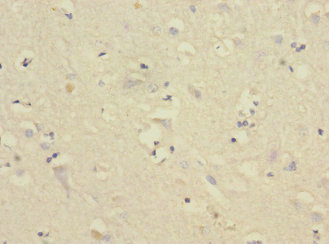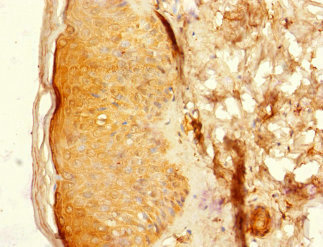CNTN4 Antibody
-
货号:CSB-PA810284ESR1HU
-
规格:¥440
-
促销:
-
图片:
-
其他:
产品详情
-
产品名称:Rabbit anti-Homo sapiens (Human) CNTN4 Polyclonal antibody
-
Uniprot No.:Q8IWV2
-
基因名:CNTN4
-
别名:AXCAM antibody; Axonal associated cell adhesion molecule antibody; BIG 2 antibody; BIG-2 antibody; Brain derived immunoglobulin superfamily protein 2 antibody; Brain-derived immunoglobulin superfamily protein 2 antibody; Cntn4 antibody; CNTN4_HUMAN antibody; CNTN4A antibody; contactin 4 antibody; Contactin-4 antibody; Neural cell adhesion protein BIG 2 antibody; SCA16 antibody
-
宿主:Rabbit
-
反应种属:Human
-
免疫原:Recombinant Human Contactin-4 protein (777-1026AA)
-
免疫原种属:Homo sapiens (Human)
-
标记方式:Non-conjugated
-
克隆类型:Polyclonal
-
抗体亚型:IgG
-
纯化方式:Antigen Affinity Purified
-
浓度:It differs from different batches. Please contact us to confirm it.
-
保存缓冲液:PBS with 0.02% sodium azide, 50% glycerol, pH7.3.
-
产品提供形式:Liquid
-
应用范围:ELISA, IHC
-
推荐稀释比:
Application Recommended Dilution IHC 1:20-1:200 -
Protocols:
-
储存条件:Upon receipt, store at -20°C or -80°C. Avoid repeated freeze.
-
货期:Basically, we can dispatch the products out in 1-3 working days after receiving your orders. Delivery time maybe differs from different purchasing way or location, please kindly consult your local distributors for specific delivery time.
相关产品
靶点详情
-
功能:Contactins mediate cell surface interactions during nervous system development. Has some neurite outgrowth-promoting activity. May be involved in synaptogenesis.
-
基因功能参考文献:
- High CNTN4 expression is associated with Pheochromocytomas and Paragangliomas. PMID: 28938490
- Association between contactin 4 (CNTN4) and antisaccade and P300 in schizophrenia. PMID: 27995817
- SNPs within the CNTN4 gene are associated with increased risk of oral cancer. PMID: 28595731
- SNPs in ITPR1 and CNTN4 are involved in the regulation of serum uric acid concentrations in Mexican Americans PMID: 27039371
- By combining methylation and SNP data, CNTN4 was identified as a risk factor for regular alcohol use. PMID: 26146898
- data reveal critical and novel roles for CNTN4/amyloid precursor protein in promoting target-specific axon arborization PMID: 25959733
- We identified CNTN4 as a novel candidate gene for POAG. PMID: 24764060
- these results suggest that rare copy number variations in CNTN4 may also influence autism susceptibility in Asian populations. PMID: 22750301
- Using array comparative genome hybridization (CGH), we identified a maternally inherited approximately 535 kb deletion at 3p26.3 encompassing the 5' end of the contactin 4 gene (CNTN4) in a patient with autism. PMID: 21308999
- Our results demonstrate the association of CNTN4 disruption with the 3p deletion syndrome phenotype and strongly suggest a causal relationship PMID: 15106122
- The contactin 4 gene (CNTN4) is associated with cerebellar degeneration in spinocerebellar ataxia type 16. Additional studies are necessary to prove 4,256C-->T to be a causative mutation. PMID: 17030759
- pathological examinations and molecular biological examinations are needed to confirm that this mutation is a true cause of SCA16 PMID: 17915252
- This report suggests that mutations affecting CNTN4 function may be relevant to Autism spectrum disorder pathogenesis. PMID: 18349135
- results do not support the candidacy of CHL1, CNTN6, and CNTN4 as tumor suppressor genes in the 3p26-pter region in ovarian cancer PMID: 19509545
显示更多
收起更多
-
相关疾病:A chromosomal aberration involving CNTN4 has been found in a boy with characteristic physical features of 3p deletion syndrome (3PDS). Translocation t(3;10)(p26;q26). 3PDS is a rare contiguous gene disorder involving the loss of the telomeric portion of the short arm of chromosome 3 and characterized by developmental delay, growth retardation, and dysmorphic features.
-
亚细胞定位:Cell membrane; Lipid-anchor, GPI-anchor. Secreted.
-
蛋白家族:Immunoglobulin superfamily, Contactin family
-
组织特异性:Mainly expressed in brain. Highly expressed in cerebellum and weakly expressed in corpus callosum, caudate nucleus, amygdala and spinal cord. Also expressed in testis, pancreas, thyroid, uterus, small intestine and kidney. Not expressed in skeletal muscle
-
数据库链接:
HGNC: 2174
OMIM: 607280
KEGG: hsa:152330
STRING: 9606.ENSP00000380602
UniGene: Hs.298705
Most popular with customers
-
-
YWHAB Recombinant Monoclonal Antibody
Applications: ELISA, WB, IF, FC
Species Reactivity: Human, Mouse, Rat
-
Phospho-YAP1 (S127) Recombinant Monoclonal Antibody
Applications: ELISA, WB, IHC
Species Reactivity: Human
-
-
-
-
-























